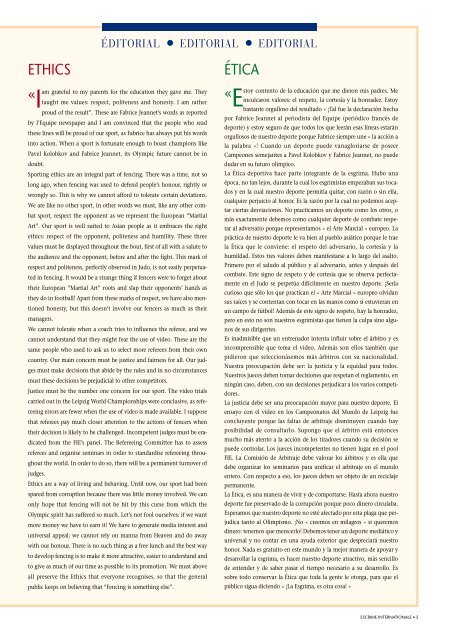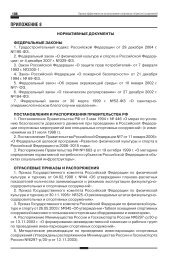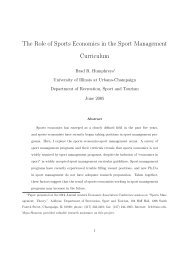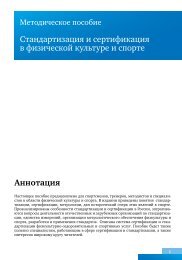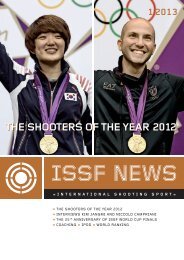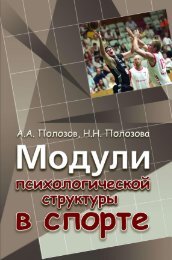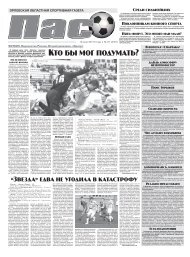Create successful ePaper yourself
Turn your PDF publications into a flip-book with our unique Google optimized e-Paper software.
ETHICS<br />
ÉDITORIAL • EDITORIAL • EDITORIAL<br />
am grateful to my parents for the education they gave me. They<br />
« taught me values: respect, politeness and honesty. I am rather<br />
Iproud<br />
of the result”. These are Fabrice Jeannet’s words as reported<br />
by l’Equipe newspaper and I am convinced that the people who read<br />
these lines will be proud of our sport, as Fabrice has always put his words<br />
into action. When a sport is fortunate enough to boast champions like<br />
Pavel Kolobkov and Fabrice Jeannet, its Olympic future cannot be in<br />
doubt.<br />
Sporting ethics are an integral part of fencing. There was a time, not so<br />
long ago, when fencing was used to defend people’s honour, rightly or<br />
wrongly so. This is why we cannot afford to tolerate certain deviations.<br />
We are like no other sport, in other words we must, like any other com-<br />
bat sport, respect the opponent as we represent the European “Martial<br />
Art”. Our sport is well suited to Asian people as it embraces the right<br />
ethics: respect of the opponent, politeness and humility. These three<br />
values must be displayed throughout the bout, first of all with a salute to<br />
the audience and the opponent, before and after the fight. This mark of<br />
respect and politeness, perfectly observed in Judo, is not easily perpetua-<br />
ted in fencing. It would be a strange thing if fencers were to forget about<br />
their European “Martial Art” roots and slap their opponents’ hands as<br />
they do in football! Apart from these marks of respect, we have also men-<br />
tioned honesty, but this doesn’t involve our fencers as much as their<br />
managers.<br />
We cannot tolerate when a coach tries to influence the referee, and we<br />
cannot understand that they might fear the use of video. These are the<br />
same people who used to ask us to select more referees from their own<br />
country. Our main concern must be justice and fairness for all. Our jud-<br />
ges must make decisions that abide by the rules and in no circumstances<br />
must these decisions be prejudicial to other competitors.<br />
Justice must be the number one concern for our sport. The video trials<br />
carried out in the <strong>Leipzig</strong> World Championships were conclusive, as refe-<br />
reeing errors are fewer when the use of video is made available. I suppose<br />
that referees pay much closer attention to the actions of fencers when<br />
their decision is likely to be challenged. Incompetent judges must be era-<br />
dicated from the FIE’s panel. The Refereeing Committee has to assess<br />
referees and organise seminars in order to standardise refereeing throu-<br />
ghout the world. In order to do so, there will be a permanent turnover of<br />
judges.<br />
Ethics are a way of living and behaving. Until now, our sport had been<br />
spared from corruption because there was little money involved. We can<br />
only hope that fencing will not be hit by this curse from which the<br />
Olympic spirit has suffered so much. Let’s not fool ourselves: if we want<br />
more money we have to earn it! We have to generate media interest and<br />
universal appeal; we cannot rely on manna from Heaven and do away<br />
with our honour. There is no such thing as a free lunch and the best way<br />
to develop fencing is to make it more attractive, easier to understand and<br />
to give as much of our time as possible to its promotion. We must above<br />
all preserve the Ethics that everyone recognises, so that the general<br />
public keeps on believing that “Fencing is something else”.<br />
ÉTICA<br />
stoy contento de la educación que me dieron mis padres. Me<br />
« inculcaron valores: el respeto, la cortesía y la honradez. Estoy<br />
Ebastante<br />
orgulloso del resultado » ¡Tal fue la declaración hecha<br />
por Fabrice Jeannet al periodista del Equipe (periódico francés de<br />
deporte) y estoy seguro de que todos los que leerán esas líneas estarán<br />
orgullosos de nuestro deporte porque Fabrice siempre une « la acción a<br />
la palabra »! Cuando un deporte puede vanagloriarse de poseer<br />
Campeones semejantes a Pavel Kolobkov y Fabrice Jeannet, no puede<br />
dudar en su futuro olímpico.<br />
La Ética deportiva hace parte integrante de la esgrima. Hubo una<br />
época, no tan lejos, durante la cual los esgrimistas empezaban sus toca-<br />
dos y en la cual nuestro deporte permitía quitar, con razón o sin ella,<br />
cualquier perjuicio al honor. Es la razón por la cual no podemos acep-<br />
tar ciertas desviaciones. No practicamos un deporte como los otros, o<br />
más exactamente debemos como cualquier deporte de combate respe-<br />
tar al adversario porque representamos « el Arte Marcial » europeo. La<br />
práctica de nuestro deporte le va bien al pueblo asiático porque le trae<br />
la Ética que le conviene: el respeto del adversario, la cortesía y la<br />
humildad. Estos tres valores deben manifestarse a lo largo del asalto.<br />
Primero por el saludo al público y al adversario, antes y después del<br />
combate. Este signo de respeto y de cortesía que se observa perfecta-<br />
mente en el Judo se perpetúa difícilmente en nuestro deporte. ¡Sería<br />
curioso que sólo los que practican el « Arte Marcial » europeo olvidan<br />
sus raíces y se contentan con tocar en las manos como si estuvieran en<br />
un campo de fútbol! Además de este signo de respeto, hay la honradez,<br />
pero en esto no son nuestros esgrimistas que tienen la culpa sino algu-<br />
nos de sus dirigentes.<br />
Es inadmisible que un entrenador intenta influir sobre el árbitro y es<br />
incomprensible que tema el vídeo. Además son ellos también que<br />
pidieron que seleccionásemos más árbitros con su nacionalidad.<br />
Nuestra preocupación debe ser: la justicia y la equidad para todos.<br />
Nuestros jueces deben tomar decisiones que respetan el reglamento, en<br />
ningún caso, deben, con sus decisiones perjudicar a los varios competi-<br />
dores.<br />
La justicia debe ser una preocupación mayor para nuestro deporte. El<br />
ensayo con el video en los Campeonatos del Mundo de <strong>Leipzig</strong> fue<br />
concluyente porque las faltas de arbitraje disminuyen cuando hay<br />
posibilidad de consultarlo. Supongo que el árbitro está entonces<br />
mucho más atento a la acción de los tiradores cuando su decisión se<br />
puede controlar. Los jueces incompetentes no tienen lugar en el pool<br />
FIE. La Comisión de Arbitraje debe valorar los árbitros y es ella que<br />
debe organizar los seminarios para unificar el arbitraje en el mundo<br />
entero. Con respecto a eso, los jueces deben ser objeto de un reciclaje<br />
permanente.<br />
La Ética, es una manera de vivir y de comportarse. Hasta ahora nuestro<br />
deporte fue preservado de la corrupción porque poco dinero circulaba.<br />
Esperamos que nuestro deporte no esté afectado por esta plaga que per-<br />
judica tanto al Olimpismo. ¡No « creemos en milagros » si queremos<br />
dinero: tenemos que merecerlo! Debemos tener un deporte mediático y<br />
universal y no contar en una ayuda exterior que despreciará nuestro<br />
honor. Nada es gratuito en este mundo y la mejor manera de apoyar y<br />
desarrollar la esgrima, es hacer nuestro deporte atractivo, más sencillo<br />
de entender y de saber pasar el tiempo necesario a su desarrollo. Es<br />
sobre todo conservar la Ética que toda la gente le otorga, para que el<br />
público sigua diciendo « ¡La Esgrima, es otra cosa! »<br />
ESCRIME INTERNATIONALE • 5


